About T-Bass UK?

Introduction
T-Bass UK were originally founded to create modern, instrumental music with an emphasis on accessibility. If the words 'electronic' and 'instrumental' are an immediate turn off then just wait a mo'. If you want a quick description then they were favourably compared to late eighties Tangerine Dream (the Private Music era), Vangelis, Jan Hammer and synth-pop pioneers Ultravox.

In the beginning...
T-Bass UK originally came into being in 1993 as Kinetic Engineering and was originally intended to be a front for the musical ambitions of writer and journalist David J. Hughes. A cover name was used mainly because another David Hughes was slowly building a big audience in the UK, albeit on the folk scene, and also because Hughes wanted to keep his journalist career seperate from any musical activities.
Armed with a DAT full of ideas, David sent off a couple of demo tapes to, amongst others, Les May of the now-defunct Midas Records. Les was convinced that here was another rising star and passed the demo tapes on to Ashley Franklin whose Soundscapes programme on BBC Radio Derby had established itself as a major showcase for UK Synthesiser talent. The provisional title of David's debut album was Tranquility Bass, a play on the name of the area of the moon where the first lunar landings took place.
Ashley liked what he heard and decided to air a couple of tracks on his programme. Sadly, fate had other ideas and the DAT and its track card became seperated. Consequently, all Ashley had to go on was the name of the album which Ashley unfortunately assumed was the name of the band. Listener response was excellent and consequently, the name stuck! This was unfortunate because there was already a band of that name in the US. Oh dear.
Encouraged, Hughes went ahead with the release of the debut album The Infection of Time in October 1995. This album was a tremendous success, gaining considerable critical acclaim and the album continues to enjoy airplay around the world to this day.
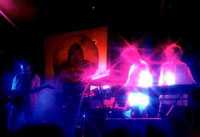
Infection, going live and a change of name
As a result of the success of the first album the band received invitations to perform at a number of electronic music festivals across Europe and America and consequently, in 1997, two additional musicians, Jules C and Dave Wilson, were recruited into the band on a full time basis.
However, three weeks before the band were due to make their debut live performance at the Fourth EMMA Festival in Derby in May 1997, the band received a Cease and Desist notice from the management of the original Tranquility Bass who were apparently unhappy with the conflict of name and the steadily rising profile of this UK synth band. Consequently, Tranquility Bass was quickly revamped T-Bass UK to avoid litigation.
Of course, the burning question is does anyone know what happened to the other Tranquility Bass? (They're still signed to AstralWerks but no original material has been released since 1997, as far as we know.).
The turnout for the EMMA 4 concert was a major disappointment and, through no fault of their own, the concert organisers found themselves facing a financial disaster. Why? Well, Kraftwerk were playing at the Tribal Gathering event the week before the EMMA festival and Jean-Michel Jarre playing at the Birmingham NEC the week after. Consequently, the fans simply didn't bother to show up.
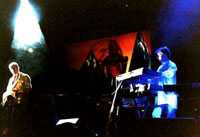
For T-Bass the concert had mixed memories. There was only around 100 paying customers in the audience. The band also experienced technical problems with their equipment which meant that they couldn't go on first, as scheduled. Indeed, David Hughes was still wiring up his keyboard rack whilst Becki Williams kicked off her performance. Says Hughes...
"That was an experience... it seems that one of our roadies hooked up the electronics incorrectly and managed to blow the MIDI out port on the master keyboard. I was forced to borrow the Macintosh Performer we'd brought down with us as a promotional tool and patch that into the rig to give me a MIDI Out port. Nerves? Yeah, we were a bit nervous throughout the performance and it showed. There were a few fluffs but they were minor, given that we were playing a lot of material completely live."
"I found the video from that gig in the loft not long ago and actually sat and watched it all the way through. I've never been able to watch it all, not in eight years, because people bitched endlessly about the mistakes we made. Trouble is, looking at the video in a detached and level-headed manner, there weren't that many mistakes. If there were errors then they were pretty minor. I'm sure I was being too sensitive, too eager to listen to other people bitching, which is all they ever do. Looking back eight years now, I happen to think that we were a good little band, not a great band, but a band that showed promise, that had something different, could perhaps make a difference..."
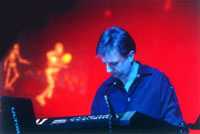
"We lost the plot!"
T-Bass UK then began work on what proved to be their difficult second album. This project went through various name changes, Ghost, Cathedral and Alien, before the band settled on the title Generator. Generator was intended to be a logical progression from The Infection of Time but a number of severe acoustic problems with their studio coupled with a really bad case of writer's block meant that the finished album was, by the band's own admission, weak when compared to its illustrious predecessor.
Undaunted, other live performances followed though this phase of the band's developed came to an abrupt halt with the now infamous appearance at the 6th Alfa Centauri festival in Huizen, The Netherlands in 1999. A five track EP, Connexion, featuring a collection of live and unreleased studio tracks was released at this concert to plug the gap left by the much-delayed Generator. The performance was a disaster and became the nadir of the band's development. Realising that they were the wrong band playing the wrong material to the wrong audience, the band took a lengthy break to recover and rethink their approach. Generator was abandoned though some of the better tracks were to appear on later releases. Hughes comments...
"I think that we failed because we were trying to do too much. We all had full time day jobs to contend with as well as a number of family issues to resolve. And here we were, trying to record, master and release the second album along with the added pressure of trying to top the previous album. At the same time we were rehearsing for the main gig and a couple of practice gigs too".
"The gig wasn't much fun at all. Technical problems, as ever, plagued the performance. We couldn't hear what we were playing, the monitor mix wasn't even, the list goes on. Afterwards, it was like a wake - a massive disappointment."
"Once we got home, I listened to the sound desk recording and it was dreadful. That was when I decided that our time was up and we shouldn't go any further. I made some serious mistakes in planning the event and it was my decisions which destroyed what should have been a very enjoyable once-in-a-lifetime experience."
"Though the majority of fans were not critical of the performance and realised that we were having a seriously miserable time up there, the more vocal minority slagged us. Some of their comments had merit. Yes, we were seriously untogether as a band, something was missing, some vital spark in the chemistry had gone. Other comments were more personal, unpleasant, nasty even. It's only music, after all."
"With hindsight, I have to say that we lost the plot a bit..."

Angelic Upstarts
It should come as no suprise then that T-Bass simply ceased to function. Though the trio remained friends, nobody felt much like writing music. In fact, the studio/live rig remained in it's flight cases for three months after the concert.
However, in July and August 1999, Hughes began work on a collection of semi-improvised ambient soundscapes and a series of experiments which later evolved into the highly successful SkinMechanix project. See the Skin Mechanix section for further details on how that project evolved...
What happened next became the stuff of legends... remembers Hughes...
"We hadn't seen Dave for a couple of months so Jules arranged a band meeting more as a social event than a proper meeting. We met up in a pub called Baroque in Sunderland, probably around midday, intent on just having a couple of drinks and keeping up to date. Somehow, we didn't leave until after nine at night and then, all of us very drunk indeed, disappeared into a Mexican restaraunt and stuffed ourselves with far too much food. Somewhere, along the line, we started talking about the band and how it would be good fun if we could try it again, just to see if we could. I don't know who suggested it. Jules was the only one taking notes I think..."
"I thought that it was a good idea. We would write some new stuff, see how it went and then look for a couple of local supportslots. I made it clear that I didn't want anything to do with the UK Electronic Music scene which had, in my opinion, disappeared right up its arse by then. There is more to life that a f*cking Moog Modular, guys!"
T-Bass UK resurfaced in March 2000 with a collection of new pieces featuring a harder, rock-oriented sound. Having returned more or less to their rock roots, any resemblance to the UK Electronic Music scene was now purely coincidental. Still nervous of playing live following the experiences of the previous year, the band played a one-off, make-or-break gig in Newcastle upon Tyne, England at the Raid on the Road showcase for local bands just to see if they could actually play live and enjoy themselves. The event was a complete success with the albeit small venue filled to capacity. The audience appreciation was tremendous and the band felt once again renewed.
"The audience were terrific. Really solid, right behind us. The applause was strong and steady and you could tell that they really enjoyed the set. Later on, a couple of people came to talk and said that they'd never heard music like that before. The local music scene is/was awash with identikit Cool Britania guitar bands and hear come this bunch of weirdos crouched behind banks of synths and really tear the place up. It was fantastic."

Back on track
After another short break, the band released their second full length album, The Fabulous Neutrinos, in 2001 to great acclaim. The album was even described by one reviewer as 'probably the best commercial synth album in the world - ever!' . Equally, the album launch party was an astonishing success with people queuing on the stairs to hear the band rip through around a dozen carefully crafted melodic tunes. Says Hughes...
With Neutrinos... we didn't want to take any chances with the sound so we booked ourselves into one of Newcastle's best studios, Face, and set ourselves the task of making a different type of electronic music album. The scene was now endlessly recycling itself and wasn't even remotely interested in what we were doing. Mutual disinterest, I guess. Anyway, we were officially Bad, such was the power of the cultural Stalinists at work on the internet back then. Who cares?
The recording schedule was hectic - one or two songs a day for a week followed by a week to master the album. The result was an album which I feel, with hindsite, has some flaws but is the only album released that year that was honest. We were and probably still are the only band in the UK EM scene playing this kind of energetic, rock-based electronic music.
Rave reviews followed the release of The Fabulous Neutrinos and further invitations to perform abroad were received, the most prominent of which was to perform at the First Festival of Electronic and Electro-Accoustic Music in St. Petersburg, Russia in July 2002. Much press coverage resulted when it was announced that the band would be sharing the bill with synth luminaries such as Rick Wakeman. The band were very disappointed when the event failed to happen both that year and the following year.
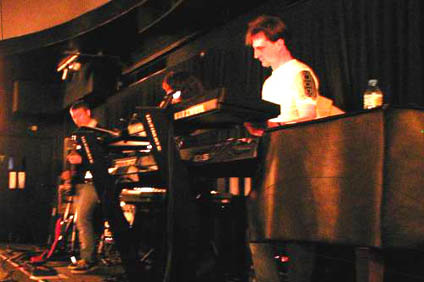
A strong return to form?
In September 2002, T-Bass UK headlined at the last ever concert to be held at the now demolished Jodrell Bank Science Centre. This turned out to be the band's finest ever live outing, warmly remembered by all who witnessed the event. The set list included several tracks from the resurrected SkinMechanix project whose debut album, The Secret Life of Angels was released at the gig. Rumours persist that the band were so loud that the building was declared architecturally unsound once the concert had finished.
In January 2003, the band name changed yet again, dropping the UK to become simply T-Bass.
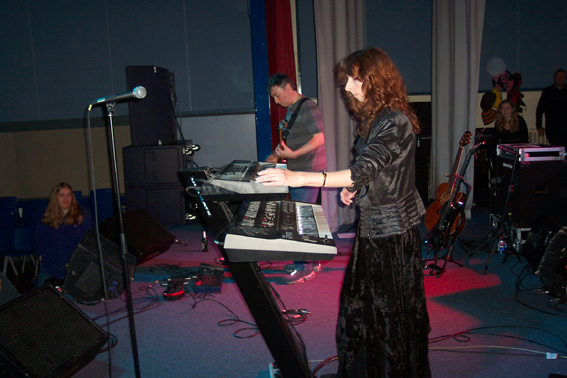
Space, The Final Frontier, or the beginning of the end
Interest outside of the mainstream UK electronic music scene was slowly building and the band became convinced that they could grow their audience quickly via a sideways jump into a genre with which they'd been vaguely associated in the past - prog rock.
As an experiment, they played a support slot for the Classic Rock Society in Rotherham in October 2003 and, whilst this gig was fairly successful, the band quickly realised that they were playing material that had hardly evolved from their original debut performance six years before.
"Jules and I had been talking about the gig and we both realised that, for some reason, it had stopped being fun. It had become like a day job and I just wanted to get back to writing and recording. I think it's what I do best. Everyone else was very, very busy with their own jobs and personal lives and we certainly had some trouble arranging rehearsals. I do remember that Jules said that she would be very happy never to play Lovesong ever again".
Their next concert, just a month later at the National Space Centre in Leicester, proved to be the final outing of this incarnation of T-Bass. The gig itself was ruined by technical problems but, perhaps worse still, Hughes was now very unhappy with the band's direction.
"I'd become completely convinced that the band's material sounded stale and uninteresting... This was the same way I'd felt before I went off with the SkinMechanix project. So, I decided to take a break for a year and to see what would happen next. We were all so busy with other activities that nothing did happen and that was when I decided that it was time to call it a day. "
After a year of little or no musical activity and with all of the members busy with their external commitments, T-Bass decided to call it a day in November 2004 but added that the project might be resurrected at some point in the future.

Update February 2012
Although there were rumours of a reunion in 2007/2008, nothing tangible materialised. Another attempt following in 2009 with the Revive project but that too festered on the back burner for far longer than is right and proper.
The good news is that David and Jules are now fully committed to the highly successful Ion project, which is really T-Bass without the difficult personalities, and so we regret to announce that T-Bass has officially disbanded. It's gone for good this time. Snuffed it. Shuffled off this mortal coil and all that...
So, check out the Ion page instead.
David J. Hughes has now been working with electronic musical instruments for over twenty five years,ever since he first fell under the spell of bands such as Tangerine Dream, Jean-Michel Jarre and Vangelis in the mid 1970's.
After graduating from the University of Newcastle upon Tyne in 1984 with a BSc in Physics David went on to work as a journalist for the magazine Sound on Sound. In 1994 he formed the band which was later to become T-Bass UK.
At the moment, David and Jules C are attempting to establish Infection Music as a manufacturer of high quality electronic musical instruments as well as producing music for the second disc from the successfull SkinMechanix project.
Jules C has been musically active since the age of nine, starting with the clarinet before progressing to the saxophone. Jules joined T-Bass UK in 1997, taking on many of the arranging duties and adding much needed warmth to some of the starker digital soundscapes.
Dave Wilson has been an active musician for 23 years and has been playing guitar in numerous other bands such as the Dirty Water Blues Band for many years. Dave joined T-Bass UK in 1997 and is currently working within an acoustic duo playing "unplugged rock/blues".
High Resolution Images for Journalists...
The following link will take you to an area reserved for a number of high resolution (300 dpi) JPEG images suitable for downloading/publishing.
In case you were wondering...
Yes, T-Bass UK used to go by the name of Tranquility Bass. However, in 1997 we discovered another band with a superior claim to the title Tranquility Bass. Hence, we changed our name in May 1997 to avoid any possible confusion.
